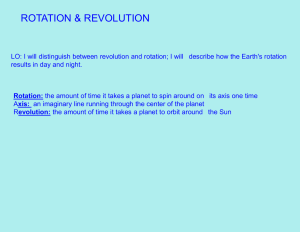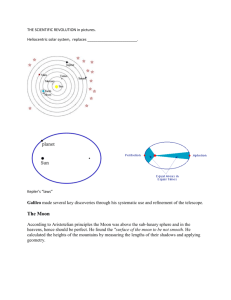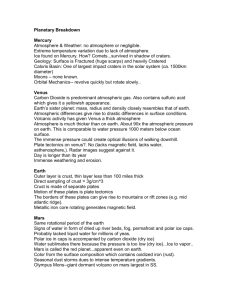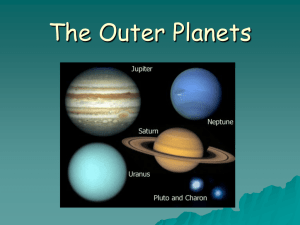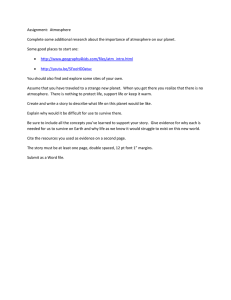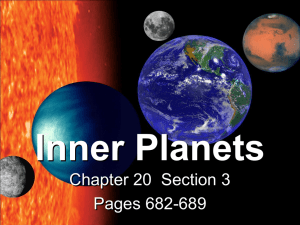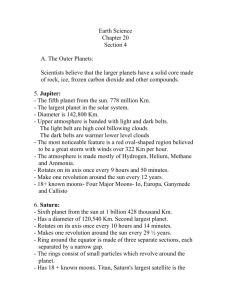SOLAR SYSTEM All objects in our solar system revolve around the sun
advertisement
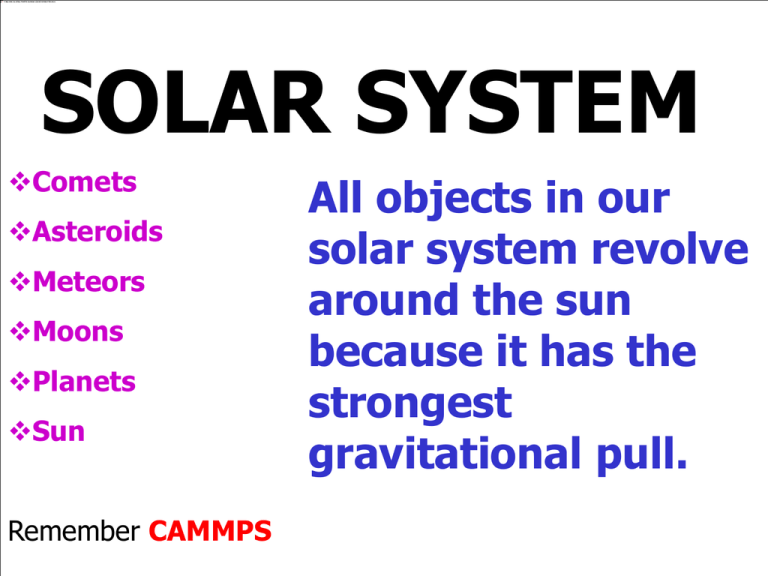
SOLAR SYSTEM Comets Asteroids Meteors Moons Planets Sun Remember CAMMPS All objects in our solar system revolve around the sun because it has the strongest gravitational pull. Sun •Average-sized star •Diameter 870,000 miles •Mostly made of hydrogen gas •Contains 99% of all material in the solar system •Temp. range from 1 million °F inside core to 10,000°F at surface Mercury •Revolution Time: 88 days •Rotation Time: 59 days •Planet closest to the sun •Greatest temperature difference from day to night •Very thin atmosphere •Covered with craters •No moons, No rings Venus •Revolution Time: 225 days •Rotation Time: 243 days •Earth’s sister planet – similar size and surface •No moons, No rings •Very thick atmosphere of carbon dioxide and clouds of sulfur •Hottest planet because of global warming gases (greenhouse effect) Earth •Only planet with liquid water •Atmosphere of 78% nitrogen and 21% oxygen •One moon, No rings •Rotation – 24 hours •Revolution time – 365 days Mars •Revolution Time – 687 days •Rotation Time – 24 hrs 40 min •2 moons, No rings •Atmosphere of carbon dioxide •Red color from iron oxide(rust) in the soil •Largest volcano – Olympus Mons Jupiter •Revolution time – 11.9 Earth years •Rotation time – 9 hrs 55 min •50+ moons, faint rings •Biggest planet •Made of gas, no solid surface •Great Red Spot, a hurricane-like storm on the surface •Atmosphere of hydrogen and helium Saturn •Revolution time – 29 ½ yrs •Rotation time – 10 hrs 40 min •53 moons •Most known for its rings •Rings made of rocks and dust •Atmosphere of hydrogen and helium •Would float in water Uranus •Revolution time – 84 years •Rotation time – 17.3 hours •Bluish green in color •11 Rings •27 moons •Rotates on its side •No solid surface •Atmosphere – 84% hydrogen Neptune •Revolution time – 165 years •Rotation time – 16 hours •Fastest winds •Faint rings •13 moons •Blue color from methane in atmosphere •Two dark storms on surface – Great Dark Spot and Scooter Pluto •Revolution Time – 248 years •Rotation Time – 6 days 9 hours •3 moons •Switches orbit with Neptune for 20 years of its revolution •Now considered a “dwarf planet” •Atmosphere of nitrogen and methane Saturn is the only planet that can float in water!!! http://pds.jpl.nasa.gov/planets/welcome.htm
